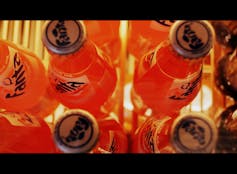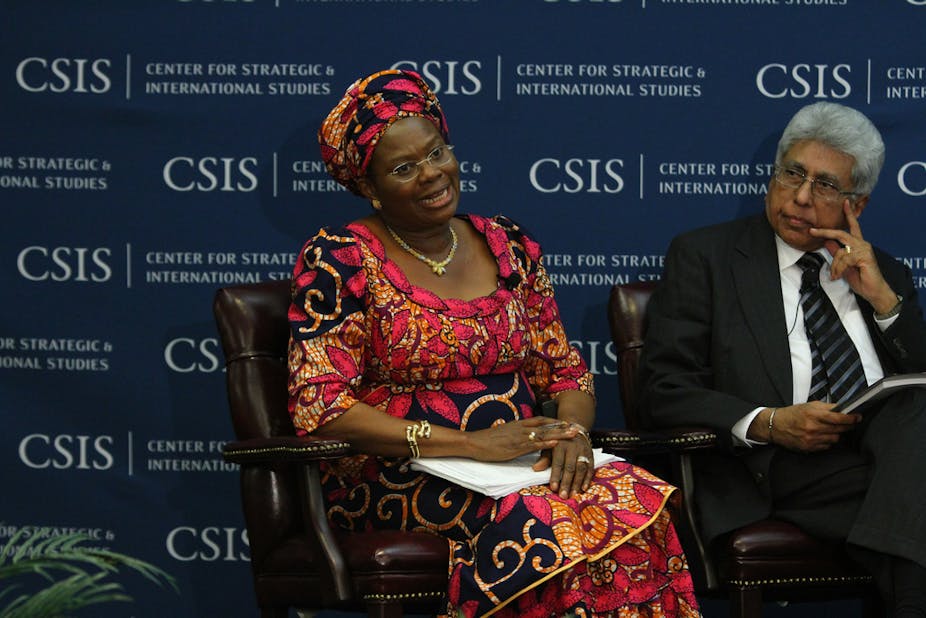With the death of Nigeria’s Dora Akunyili, a passionate campaigner against falsified and substandard medicines, the fight against fake drugs in Africa just got more difficult. Akunyili was director-general of the country’s National Agency for Food and Drug Administration and Control (NAFDAC) from 2001 to 2009. During her tenure, she led high-profile campaigns against ineffective drugs in the Nigerian marketplace, winning international acclaim and numerous accolades in the process. Yet despite Akunyili and other campaigners building widespread attention and momentum about fake and substandard medicines, they remain a major concern in Nigeria, and indeed much of the developing world.
Some research suggests that as much as 15% of all drugs sold worldwide are fake or substandard. In some places, this may be far higher – for example, one south-east Asian study reported that more than half of all anti-malarials sold contained no active ingredient. As well as being a major cause of avoidable deaths and disease, such products have other malign consequences. Medicines that contain a dose weaker than the label’s description may enable drug resistant strains of diseases. And as genuine products are undercut in the market place, the incentive for pharmaceutical companies to develop innovative drugs against diseases common in poor countries is diminished.
Unscrupulous traders

The category of fake and substandard drugs encompasses a wide range of issues including deliberate schemes to sell fake products, and selling products where problems in manufacturing or storage result in poor quality. It is a problem that operates at various scales and levels of sophistication; in recent Nigerian fieldwork, I was told of unscrupulous traders who used water coloured with clothing dyes or even Fanta to mimic an orange-coloured drug. Elsewhere, elaborate international criminal networks circumvent border controls and manufacture counterfeit products that are very difficult to distinguish from authentic ones.
At a policy level, debates over generic drugs have created an unfortunate distraction. Advocates from the pharmaceutical industry have been quick to point out that many generic products are of poor quality, and should therefore be addressed by the same initiatives that tackle counterfeits and fakes. Other campaigners, however, have pointed out that this argument unhelpfully conflates issues of intellectual property and public health – after all, many generic drugs are of perfectly adequate quality.
Combating the trade
In an attempt control this crisis, the pharmaceutical industry and national authorities have explored various innovations. In terms of technology, this has included packaging features that are harder to copy, such as scratch panels with codes for verification via SMS, and equipment for testing drug quality more quickly, easily, and cheaply. Policy-wise, this has meant revising out-of-date or inadequate regimes of drug registration. Enforcement too has been important – in Nigeria for instance the seizure and destruction of fake products has often been conducted in a very public way, to act as a deterrent and raise public awareness.
Tackling fake and substandard drugs is, and will continue to be, an intimidating challenge for the foreseeable future. The lucrative nature of pharmaceutical industry is a permanent temptation, and even the most committed and well-resourced regulators cannot monitor a supply chain that stretches across the globe and into every village shop.
The economics of enforcement are also often discouraging – drugs sold for just a few pence can cost hundreds of dollars to test. A further difficulty is that despite longstanding recognition of the scale of the problem, the evidence on just how big is surprisingly patchy, and research is often limited to small-scale case studies.
A dysfunctional Nigerian state can act
Despite the proliferation of initiatives that have sprung up over the last decade or so, some important issues still receive inadequate attention. The quality of veterinary drugs that are so crucial for rural livelihoods and food security, for example, has received comparatively little attention. Following years of complaints from Nigeria’s veterinary authorities, NAFDAC only established a veterinary drugs directorate last year.
Akunyili accomplishments at NAFDAC defied her country’s notoriety for corruption and mismanagement. As a Nigerian public servant with an international reputation for integrity, she had only a handful of peers; an anti-corruption officer here and a former central banker there. And even as Akunyili became a more politicised figure in her later life, serving in the federal government cabinet and mounting an unsuccessful campaign to be elected a senator, news of her death was received with great sadness by many Nigerians.
For an agency with such a specific mandate, NAFDAC’s campaigns have a remarkable high profile; they appear daily in Nigeria’s newspapers and television channels and have helped to re-build confidence in a drug market that was spiralling out of control. Equally importantly, the agency serves as an example that a dysfunctional Nigerian state emerging from the military rule of the 1990s can nonetheless act decisively to protect its citizens. These efforts cemented Akunyili’s deserved reputation for integrity and vigour – and tackling the ongoing and multifaceted problem of drug quality will need a great deal more of these same qualities.

